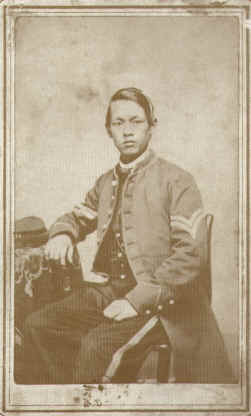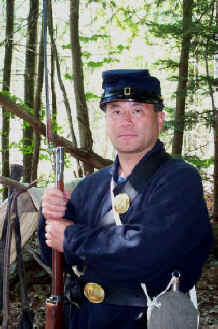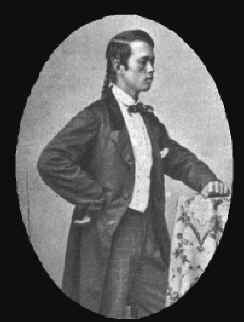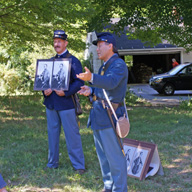
Tom Brokow’s best-selling book, The Greatest Generation, refers to that generation fighting during World War II making the world safe for democracy, as “the greatest generation.” My own belief is that the generation who fought on both sides of the American Civil War could have the greater claim to being the “greatest generation” in our nation’s history. Unlike World War II, the Civil War was fought on American and not on foreign soil, between Americans. This “Brothers’ War” resulted in 600,000 casualties. If we were to apply this number as a percentage of the population then, this would be the equivalent of losing 5,000,000 Americans today. The North’s victory resolved two issues left unanswered by the American Revolution: whether in a free government states have the right to breakup the government whenever they choose and whether this republic would continue to endure half slave and half free. It uprooted institutions that were centuries old, transformed the social life of half the country and profoundly impacted our entire national image to the rest of the world. The consequences have set the course of this country to become “a great melting pot” of immigrants into a single nation that Abraham Lincoln called the “last best hope of earth.” It was for these reasons that my parents immigrated to this country from China in order to share in the great “American dream” of having the opportunity and freedom to better themselves and to become productive members of their community. In a sense, this was what the “greatest generation” was fighting to preserve during WWII. As I reflect more and more on the life of Joseph Pierce, I have come to realize that this unique individual whose life God continually had his hand on, not only contributed to the outcome of the Civil War making this country into what it has become, but actually lived the “American dream” before it even became a possibility. Consider the following. Although Pierce was sold by his father at the age of ten to a sea captain, he did not spend his life at sea as a cabin boy or servant. Amos Peck for some reason took a liking to him and brought him to be raised by his mother in Berlin, Connecticut. Here he was treated as part of the Peck Family, attending the same country school with Peck’s younger brothers and sisters. Pierce in 1853 was most likely one of the few Chinese in New England and in Connecticut at the time. Although the first recorded Chinese began to come to America in 1848, the first significant immigration occurred in 1852, confining itself to the Pacific coast. The Pecks with whom he was raised were a prominent family, descendants of Deacon Paul Peck, one of the original proprietors, who along with Thomas Hooker, founded Hartford, Connecticut. Pierce was an accepted member of his community when he enlisted on July 26, 1862 for, undoubtedly, the same reasons the early volunteers who had answered President Lincoln's call for troops had. He was mustered into the Fourteenth Regiment, Company F of the Connecticut Volunteer Infantry that became part of the Second Brigade of the Third Division, Second Army Corps of the Army of the Potomac. From 1862 to 1865, Pierce unknowingly participated in what turned out to be many of the pivotal military events of the war, fighting in the major campaigns from Antietam to Gettysburg to Lee's surrender at Appomattox Court House. He survived some of the bloodiest battles fought during the Civil War. The Fourteenth Connecticut participated in thirty-four battles and skirmishes, lost more men killed in battle in proportion to its size (only 215 (21%) of the original 1,040 men who left to fight returned home) and captured more prisoners, cannon and battle flags than any other Connecticut regiment. These experiences made Pierce the most renown and highest ranked (corporal) Chinese soldier to have fought in the Civil War. Unlike many veterans who could not settle back to their pre-war lives, he apparently made the transition back to civilian life without too much difficulty. There is no record of him joining any GAR Post after the war; he was able to place this chapter of his life behind him to move on with his life. In 1868, Joseph Pierce settled in Meriden, Connecticut, and for the 48 years that remained in his life, he lived, worked and worshipped within a two-mile radius of his home on Meridian Street. He listed his occupation as being a farmer when he enlisted to serve with the Fourteenth Connecticut, but in the 1870-71 Meriden City Directory his occupation is listed as being an engraver. His “sisters” with whom he grew up, married into families who established the silver smith trade in Meriden (the city became known as the “silver city”). This family tie apparently opened a door for him to enter a professional trade. On November 12, 1876, at the age of 34, Joseph Pierce, married eighteen year old Martha Morgan, an American woman, from Portland, Connecticut. Just think of the courage both of them had to marry outside the social conventions of that time! What a wonderful story in itself that the two of them married out of love. I would like to believe that the other picture we have of Pierce in formal attire was taken for his wedding to Martha. This marriage produced four children, two daughters, and two sons. Only the sons survived to adulthood. On March 27, 1890, Joseph and Martha were received as probationary members of Trinity Methodist Episcopal Church receiving full membership on November 6th, four days before his 48th birthday. When his oldest Daughter, Lulu Edna, died at the age of sixteen on February 17, 1895, many people in the community shared in the family's grief. According to the Meriden Daily Republican of February 20, 1895 there were many “floral ensembles” from the church and engravers of the Meriden Britannia Company. He worked for the Meriden Britannia Co. for a period of twenty-six years before retiring at the age of 72 in 1914. On January 3, 1916, Joseph Pierce died at the age of 73 after a long complicated illness. He was buried in Walnut Grove Cemetery less than a mile from his home. His obituary made no mention of his service during the Civil War but simply stated that he was “well-known and liked.” His country, however, remembered his participation and contributions by granting him a military pension in 1913 and a monument to mark his gravesite. His life is this nation’s immigration story in microcosm. Joseph Pierce lived the “American Dream”. He had the opportunity to live a life where he was able to work in a respectable trade in order to provide for his family. He was able to marry out of love the wife of his choosing. He became an accepted and respected member of his community... the very things that all immigrants aspire to when they come to this country, but are often denied. We may never be asked to make the extraordinary sacrifices these men who fought in the Civil War so willingly offered to make. But as inheritors of the great individual freedoms so costly won as a result of the Civil War, we must not forget the contributions of the Chinese soldiers and sailors and other immigrants who fought and died to preserve the opportunities we have under these freedoms. We can begin by honoring and respecting the contributions of all nationalities who make up this country called the United States and to accept them as fellow Americans. |


Irving Moy |

An American Journey- My Father, Lincoln, Joseph Pierce and Me
For reviews and to order a copy of this book click on the book cover
For more information on Chinese Serving during the Civil War please visit the following links by clicking below.
Home Preservation Re-Enacting Civilian Impressions Authenticity Joseph Pierce
Photographs Sutlers Hincks' Mess Research Veterans School of the Soldier Readings
© 2011 Company F, Fourteenth Connecticut Volunteer Infantry 1862-1865, Inc. All rights reserved.

Asians and Pacific Islanders and the Civil War: In the last several decades a small group of historians, researchers, writers and civil war enthusiast
|
||||||
